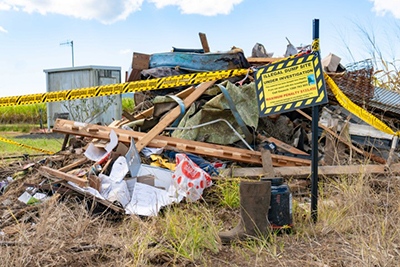Littering and Illegal Dumping
Littering and illegal dumping are major issues on the Cassowary Coast and are among the most visible indicators of pollution in our environment. Waste from litter and illegal dumping is present across our region, and found in areas such as footpaths, roadsides, beaches, car parks, waterways, vacant blocks, and natural areas such as world heritage Wet Tropics Rainforest and national parks.
Littering and illegal dumping harm the safety, security, and natural beauty of our region, impacting our wet tropics rainforest, coastal areas, and local communities.
Keeping Queensland Clean: the Litter and Illegal Dumping Plan
Report Illegal Littering or Illegal Dumping
Help us keep the Cassowary Coast safe and beautiful by reporting to us via Snap Send Solve if you see litter or illegally dumped items.
If you witness a person littering or illegally dumping waste from a vehicle, trailer or vessel, you can report this to the Department of Environment, Science and Innovation (DESI) by completing their Littering and Illegal Dumping Reporting Form. Take note of any information that may be of use for the report, including:
- any identifying information such as a vehicle's registration number, make and colour
- the time and date of the event
- the location the event took place.
Rubbish and Litter in Public Areas
Have you noticed a problem with littering, or our public rubbish bins at foreshores, parks, beaches, playgrounds or other areas require emptying?
You can report concerns regarding:
- Overflowing public waste bins
- Damaged public waste bins
- Missing public waste bins
-
Littering, as defined under the Waste Reduction and Recycling Act 2011, refers to the disposal of waste less than 200L in volume.
Common litter items include cigarette butts, paper, and plastic.
Although small, cigarette butts account for over a third of all littered items. Their plastic filters often end up in waterways, posing a serious risk to marine life, as birds and sea creatures mistake them for food, leading to starvation. Additionally, cigarette butts discarded from vehicles can spark bushfires, endangering lives and property.
-
 Illegal dumping is the unlawful deposit of any type of waste material, and penalties apply.
Illegal dumping is the unlawful deposit of any type of waste material, and penalties apply.Common illegally dumped items include:
- household rubbish and garden waste
- household goods (such as whitegoods, TV’s, mattresses and furniture)
- building waste (construction and demolition materials)
- tyres, chemical drums and paint tins
- asbestos.
-
Illegal dumping is un-clean, un-safe, and un-acceptable! There is never a good enough excuse for residents to dispose of their rubbish in ways that pollute our natural environment, and vandalise our region. Not to mention the cost of removing illegal waste, which unfortunately passes on to our community. Waste can also affect and harm our native wildlife, some of which are endangered species.
-
Illegal dumping pollutes our environment and significantly diminishes the use, enjoyment and value of our public places—making our communities and natural areas look dirty and uncared for, unpleasant to be in, and less likely to be used by the public
A poor and uncared for environment leads to more dumping, other illegal activities and antisocial behaviour. This, in turn, can lead to reduced community pride and property values.
Illegal dumping costs Queensland communities millions of dollars each year in waste management and clean-up expenses. Illegal dumping of items containing chemicals or asbestos can directly cause harm or injury to humans and wildlife, and major pollution.
Animals can also become entangled in dumped items leading to injury and death. Illegal dumping can also introduce pests and weeds into our natural areas, block waterways and roads, cause flooding (by blocked drains) and facilitate higher rates of erosion by smothering natural vegetation cover.
Alternatives to illegal dumping
-
All green waste received at our Waste Transfer Stations is then processed into mulch. Domestic disposal of green waste is FREE. Please take care to ensure that green waste is free from contaminants such as star pickets, plastics, wire etc. The mulch is generally available at Transfer Stations for collection. Receiving of mulch is FREE for domestic residents if self-loaded, otherwise a small fee of $5 per m3 will be charged if a staff member is requested to load the mulch for you.
-
Council works together with local groups to recycle and/or prevent as many items as possible from unnecessarily ending up in landfill. Items include cardboard, fertiliser bags, Container Refund Scheme eligible containers, mobile phone batteries, and printer cartridges. There are facilities for recycling at each Waste Transfer Station. All domestic recycling is FREE except for: fridges, freezers, tyres, spring mattresses, LPG gas bottles and fire extinguishers.
-
Tip Shops are located at most Transfer Station sites, where reusable products can be dropped off free of charge. Reusable items are also available to purchase at a low cost.
Click on the links below to find out more about Waste Managment:
